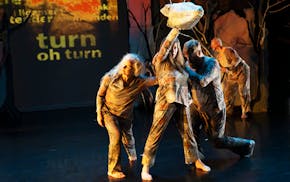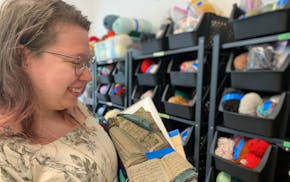Jeff Johnson's life is full of creativity and zest: He runs his own Minneapolis design firm, turns a mean polka and once starred in a Norwegian realty TV series. And he's decided that a memorial to mark his eventual death — outlined in a seven-page legal directive titled "Jeff Johnson's Awesome Funeral Party!!" — should reflect his idiosyncratic personality.
Johnson's instructions enlist his family and friends to paddle Minneapolis' Chain of Lakes and spread his ashes, which are to be mixed with tobacco, coffee grounds, Pop Rocks and biodegradable glitter. After dinner in Uptown (with an open bar), he plans to have seven archers fire flaming wooden arrows into the water. And send attendees home with funeral swag: a commemorative Nalgene stuffed with a small bottle of gin and bag of coffee, a cigar, a pocketknife, and a pack of firecrackers.
"I've been to so many funerals where it's just like: This does not reflect the person who is shipping out," said Johnson, who is in his 50s but wanted to make arrangements before he might face a major health issue. "I don't want anybody having a horrible time at my funeral if I have the ability to plan it."
As American participation in organized religion declines, more funerals are being held outside places of worship. And some of those planning ahead are eschewing the usual script — liturgical service followed by buttered ham sandwiches in a fellowship hall, per Johnson's cultural tradition — to envision a celebration of life more tailored to their individual preferences.
To do so, some Minnesotans, Johnson included, are turning to a new Forest Lake-based funeral provider, SendOff, specializing in personalized memorials.
The company's SendOffs, as the events are known, can incorporate faith elements, or supplement a traditional religious service. But they might conclude with a fireworks display, or with guests twirling to "Dancing Queen" in lieu of a recessional hymn. One recent SendOff was held at a golf course and attendees teed off with the deceased's clubs. At another, guests received hockey pucks emblazoned with the dearly departed's face.
Kelly Roberts, SendOff's founder, says he's focused on creating experiences that honor the deceased in an authentic way. If the person's last wish is that his loved ones play a hockey game, with his casketed body placed at center ice for the opening faceoff (Roberts' actual vision for his own SendOff), his team can make that happen. "Our goal is to feel the individual's presence in that space," he said.
A cue from weddings
Roberts has been in the death care business since he and his brothers launched Roberts Family Funeral Home in Forest Lake in 2005. Over the decades, he watched personal branding take hold of the wedding industry: couples marrying not in a church, temple or synagogue, but a park or a brewery. And customizing their celebration's every detail, down to the signature cocktails and swag. "Back when I got married in the late '90s, the idea of being married in a barn would have been absolutely absurd," Roberts said.
Seeing nontraditional venues and personalized flourishes become mainstream in weddings, Roberts created SendOff in 2022 to bring a similar approach to funerals. "We give families permission to really think outside of the box — pun intended — and to let them know that it doesn't have to be what is always done, and what they've always known."
Nationwide, a few other companies are known for personalized funerals, Roberts said. But most have an event-planning background focused on celebrations such as weddings and birthdays. SendOff, instead, comes to the role as a licensed funeral provider attuned to the needs of grieving families, with staff to transfer and prepare the deceased for burial or cremation. While other Minnesota funeral providers offer customization, SendOff is a rarity in specializing in individualized, event-based memorials. (Pricing for celebration of life services starts at $5,500, excluding costs for burial, cremation and third-party fees.)
Michael LuBrant, director of the mortuary science program at the University of Minnesota, says funeral directors are increasingly having in-depth conversations about end-of-life arrangements and presenting a wider variety of options. More memorials are involving both religious and secular aspects, sometimes including clergy and celebrants. And funeral directors are showing greater flexibility in meeting the differing needs of family members to facilitate their healing. "It's important to be creative," LuBrant said, "which is very, very different from years ago, where there was one way of doing things."
If loved ones feel comfortable, participation in the memorial can make a more heartfelt connection, LuBrant said, using the examples of loved ones placing a fishing bobber in the casket, or tossing a flower on top of it. As can bringing home a keepsake that reminds them of the deceased, such as a packet of cocoa mix or seeds.
These concrete, emotional experiences can lend a sense of comfort, LuBrant said, paraphrasing Maya Angelou: "People will forget the words, but they won't ever forget how they felt in that moment."
Marking individuals
After Cheryl Hauser was diagnosed with Alzheimer's disease, she planned for her death and her SendOff — going so far as to take her daughters shopping to buy them dresses to wear at her funeral.
After Hauser's death last year, the family held a memorial service at her Minneapolis church and then hosted hundreds of loved ones in an industrial-mod event space nearby. Party attendees eulogized Hauser, sipped signature cocktails (a bourbon-based drink dubbed "Live Out Loud"), munched on popcorn (a favorite snack) and perused a display of her artwork. SendOff coordinated all the details, from procuring temporary tattoos to managing parking, which Hauser's family said allowed them to take in the event without the distraction of worrying about logistics.
"I sat at my mom's funeral and I listened to every word," said daughter Sarah Longacre. "I was holding on as deeply as I could."
Longacre had initially resisted attending the meeting her mom had set up with SendOff, thinking it was unnecessary. But as soon as staff started posing questions to Hauser — everything from "What does death mean to you?" to "What are your favorite foods?" — Longacre realized SendOff could get the family on the same page and holistically support them through the process of Hauser's departure.
"They're a tour guide to a country you've never been to," Longacre said, noting how comforting it was to have SendOff staffers who had met Hauser remove her body, instead of an anonymous undertaker. "It's everything from choosing the urn to deciding if there is a receiving line, to processing what the dying want and what the living need."
Longacre's sister, Wendy Brown, said planning ahead for a funeral can take the pressure off family members and give the person facing death a sense of agency. "When their world is spinning, or they can't control their disease, and they don't have a lot of choices, they can say, 'I love this song,' or 'I'd love the kids to be painting rocks that are going to go in the garden.'"
Longacre recently attended a funeral service during which the deceased's name was hardly mentioned, which reinforced her sense that death needs to be marked with ceremony and ritual, but also individuality. "We need closure, we need gathering, we need community," she said. "And we need it to embody who that person was, and what legacy, and what story, and what footprint they left."

Review: Mythical deer instigate change in a multimedia dance work

Can a prison be beautiful? And should it?

Never mind the oldies — here are 10 younger acts to see this summer in Minnesota

Review: Conrad Tao delivers a thrilling Beethoven piano concerto with the Minnesota Orchestra

